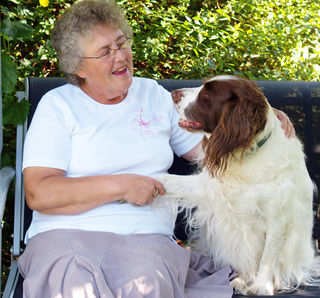Animal Behavior
The Challenges and Benefits of Pet Ownership for Seniors
Seniors who like animals should have opportunities for human-animal interaction
Posted June 19, 2019 Reviewed by Gary Drevitch
Recently, a 104-year old man from California was in the news because of his love for his rescue dog. After being turned down by several rescue organizations, Lionel’s Legacy allowed Milt Lessner to be a long-term foster for a senior dog, Layla. "We're trying to stay in good health, both of us. So far, we've succeeded and we're still alive," Lessner told the BBC.

In a nutshell, this story shows both the benefits and challenges for seniors wanting to have a pet. New research by Prof. Marie-José Enders-Sleggers and Dr. Karin Hediger, published in Anthrozoös, reviews the scientific literature on pet keeping for older adults. They find that pets can provide social interaction and protect against loneliness, but a lot could be done to make life easier for seniors with pets. And just as for millennials with pets, housing that doesn’t allow pets can be an issue.
Being able to keep a pet should be possible at any age, Enders-Sleggers and Hediger write:
“The ability to interact with animals should be preserved throughout the course of life for those who enjoy interacting with animals, whether through pet ownership or other forms of human–animal interaction.”
Research has shown having a pet has several benefits for older adults, including higher levels of physical activity which in turn may lead to better health. As well, because pets need a routine of feeding, walking, etc., this gives older adults a daily routine. Pets can be protective against feelings of loneliness, provide emotional support, and give people something to talk about, perhaps a way to make friends or to chat to caregivers.
But not all studies show a benefit. One study of pet ownership in 60-64-year-olds found no health benefits, while another study found a link between dog ownership and depression, although the causal relationship is not clear. In particular, for this age group, which may be less mobile and more likely to have balance issues, pets (and their accoutrements such as pet beds and food bowls) can be a tripping hazard.
For people on a pension, the costs of pet ownership may be prohibitive, or they may elect to spend money on a pet at the expense of food or other items for themselves. Friends and family may try to discourage seniors from getting a pet due to concerns about who will take care of the animal if the person moves into an assisted living facility or passes away. There may also be concerns about getting infectious diseases from the pet, although the paper says that if older people are in good health they are not necessarily at any greater risk than others.
Because seniors with pets may be less likely to visit the doctor or agree to hospitalization if they worry about their pet, hospitals could have a plan to specifically ask about pets on intake and connect people with those who can help. For example, some animal shelters and charities will care for pets while someone is in a hospital.
Seniors with pets may also delay moving into care homes or assisted living, even past the point when they are able to live independently because those homes do not take pets. Where possible, allowing people to keep a pet when they move would be beneficial and humane.
The authors also recommend that seniors talk through possible options for their pet with caregivers and family members, so that everyone knows what they would like to happen in the worst-case scenarios.
Older pets need to visit the veterinarian more often. The authors say that when getting a pet, it is important to consider how the person will be able to care for the pet in the future, given that cats and dogs may live 15 years or more. However, they also point to research in Italy that found the pets of older people have a good quality of life, and the owner’s age is not a factor in that. Rather, information, attachment to the pet, and rural or urban living all played a role.
Strategies to help pets remain in people’s homes are needed, whether through informal networks or organizations that can, for example, walk people’s dogs or give people a ride to the veterinarian.
As well, the report suggests that seniors who want contact with animals but do not have pets themselves might be able to offer help to those who do. For example, an organization in The Netherlands matches seniors up with families with pets, so that the seniors can keep the pet company while everyone else is out at work.
Facilities for older adults can develop schemes to bring animals in, such as visits from therapy dogs, although there is also a need for policies on what kind of dog is suitable and how to keep the risk of infection low.
Ultimately, the report offers creative solutions to issues that seniors with pets or who want contact with pets may face. While pet-keeping may have many benefits for seniors, the researchers conclude that each person has to weigh the benefits and risks for themselves. For Lessner, the benefits are clear. He told the BBC, "I can't think of anything better."
References
Enders-Slegers, M. J., & Hediger, K. (2019). Pet ownership and human–animal interaction in an aging population: Rewards and challenges. Anthrozoös, 32(2), 255-265.




